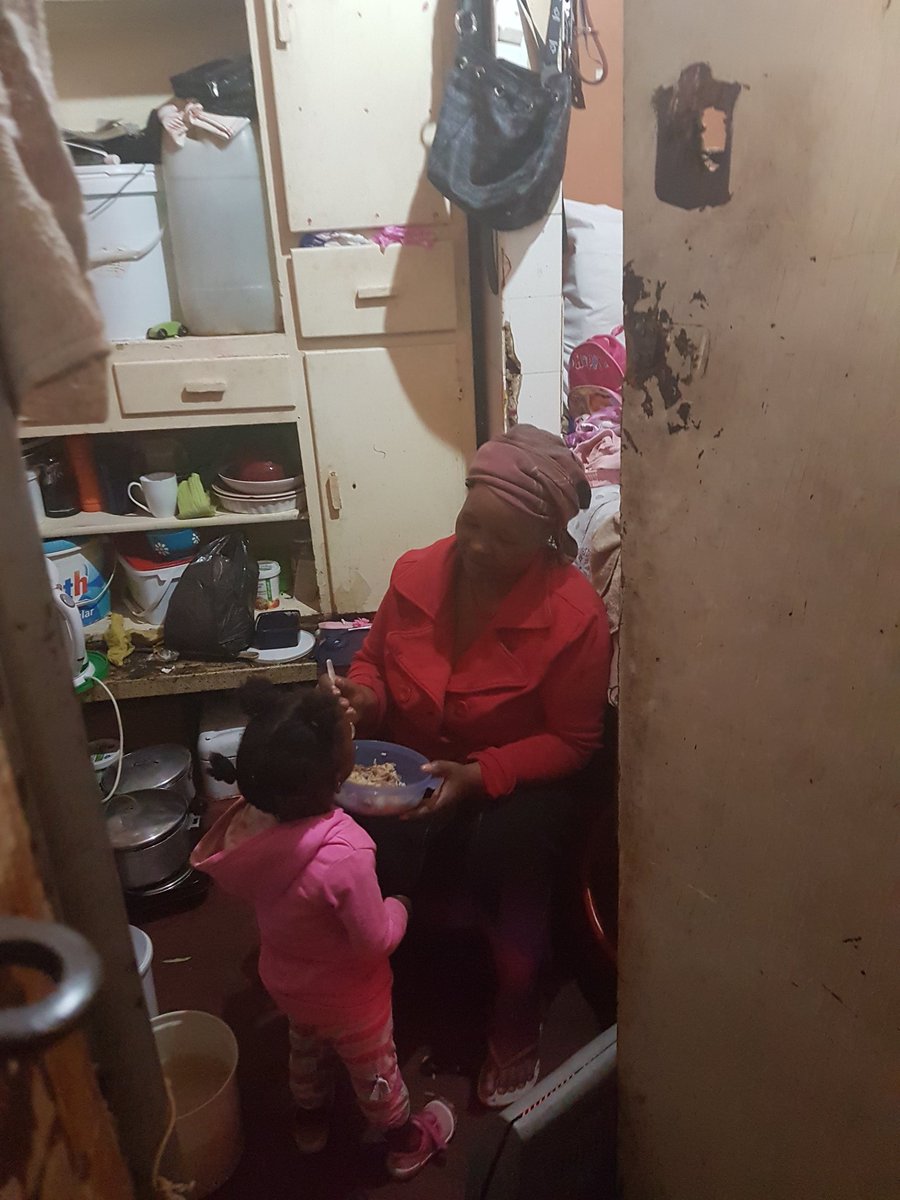
This family lives in what used to be a kitchen
“and Makwerekwere drifting into and out of Hillbrow and Berea having split into Berea from Hillbrow according to many xenophobic South Africans and their glamorising media and into Braamfontein to sort out their refugee affairs and the streets of Hillbrow and Berea and Braamfontein overflowing with Makwerekwere come to pursue green pastures after hearing that the new president Rolihlahla Mandela welcomes guests and visitors unlike his predecessors who erected deadly electric wire fences around the boundaries of South Africa trying to keep out the barbarians from Mozambique Zaïre Nigeria Congo Ivory Coast Zimbabwe Angola Zambia from all over Africa fleeing their war-torn countries populated with starvation like Ethiopia” Phaswane Mpe: Welcome to Our Hillbrow
Last Thursday, the Constitutional Court of South Africa ruled that judges cannot authorize an eviction order that will leave people homeless. Over the past 25 years, South Africa’s highest courts have ruled consistently that the rights of residents, including occupiers, matter. Even with those protections in place, this decision is viewed as groundbreaking and welcome. The case involves 184 people – 47 women, 114 men, 23 children – who have occupied an apartment building in the Berea neighborhood of Johannesburg’s inner city. Hlengiwe Mhlambo is one of the 184. She is forty years old, a mother of two, and an informal trader. For the past 14 years, Hlengiwe Mhlambo has lived in her apartment, eking out a meager living, raising her children, hoping to find, or better create, the once promised green pasture.
Current residents have occupied the building anywhere from four to 26 years. Vusumuzi Dlamini moved in in 1991, and has been living there ever since. Samkelo Myeza moved in in April 2013, and has lived there ever since. For Dlamini, Myeza, Mhlambo and all the residents, things started changining in 2013. A new owner served the residents with an eviction notice. The residents went to a local ward committee member, who said he’d investigate the matter. In September, the case went to court. The ward committee member attended. Four residents, known as appearers, attended. Hlengiwe Mhlambo was one of the four. The owner’s lawyers appeared. The appearers attended to appeal for a postponement. The ward committee member told the court that an agreement had been reached between the owner and the residents, and that residents had agreed to their own eviction. As the Constitutional Court notes, “The applicants were not legally represented.”
Hlengiwe Mhlambo is clear that she did not have the authority to represent the 184 residents and that she, personally, never agreed to be evicted. The main point is that that applicants were not legally represented. They had no lawyers. No one explained their rights. They never fully understood the proceedings. For example, they did not know that the law states that before a judge can issue an eviction order, she or he must consider “all the relevant circumstances, including the rights and needs of the elderly, children, disabled persons and households headed by women.”
South Africa’s Constitutional Court decided that people have a right not to be homeless: “It is a well-established principle that an eviction from one’s home always raises a constitutional issue … The starting point is section 26(3) of the Constitution which provides that `[n]o one may be evicted from their home, or have their home demolished, without an order of court made after considering all the relevant circumstances’. Accordingly, courts seized with eviction matters are enjoined by the Constitution to consider all relevant circumstances … An order that will give rise to homelessness could not be said to be just and equitable, unless provision had been made to provide for alternative or temporary accommodation … Where there is a risk of homelessness, the local authority must be joined … Courts must be alive to the risk of homelessness and the issue of joining the local authority to discharge any duties it may have … All of this may appear unduly burdensome but it is necessary if one has regard to the fundamental importance that a person’s home has to the realisation of almost all human rights. More importantly, the procedure is constitutionally enshrined and legislatively enacted”
The residents were represented by the Socio-Economic Rights Institute, SERI. After the decision, their attorney Nomzando Zono, explained, “This is a momentous decision for millions of poor people across South Africa who live with insecure tenure and inadequate housing. As of today, our courts are forbidden from making eviction orders – even if they have been agreed to – until those under threat of eviction are aware of and able to exercise their rights, and until a Judge can be sure no-one will be left out on the streets.”
In the worldwide political economy of global cities, in which urban real estate is a driving economic force, we are so far from a politics that acknowledges “the fundamental important tht a person’s home has to the realisation of almost all human rights.” Last week, the South African Constitutional Court called on us, all of us, to remember the place of the home. No one can consent to an unfair eviction. No one can consent to homelessness. Homelessness is a violation of our most fundamental human and civil and Constitutional rights, wherever we live. Let’s join with Hlengiwe Mhlambo and make it so.
(Photo Credit: Twitter / Candice Nolan)